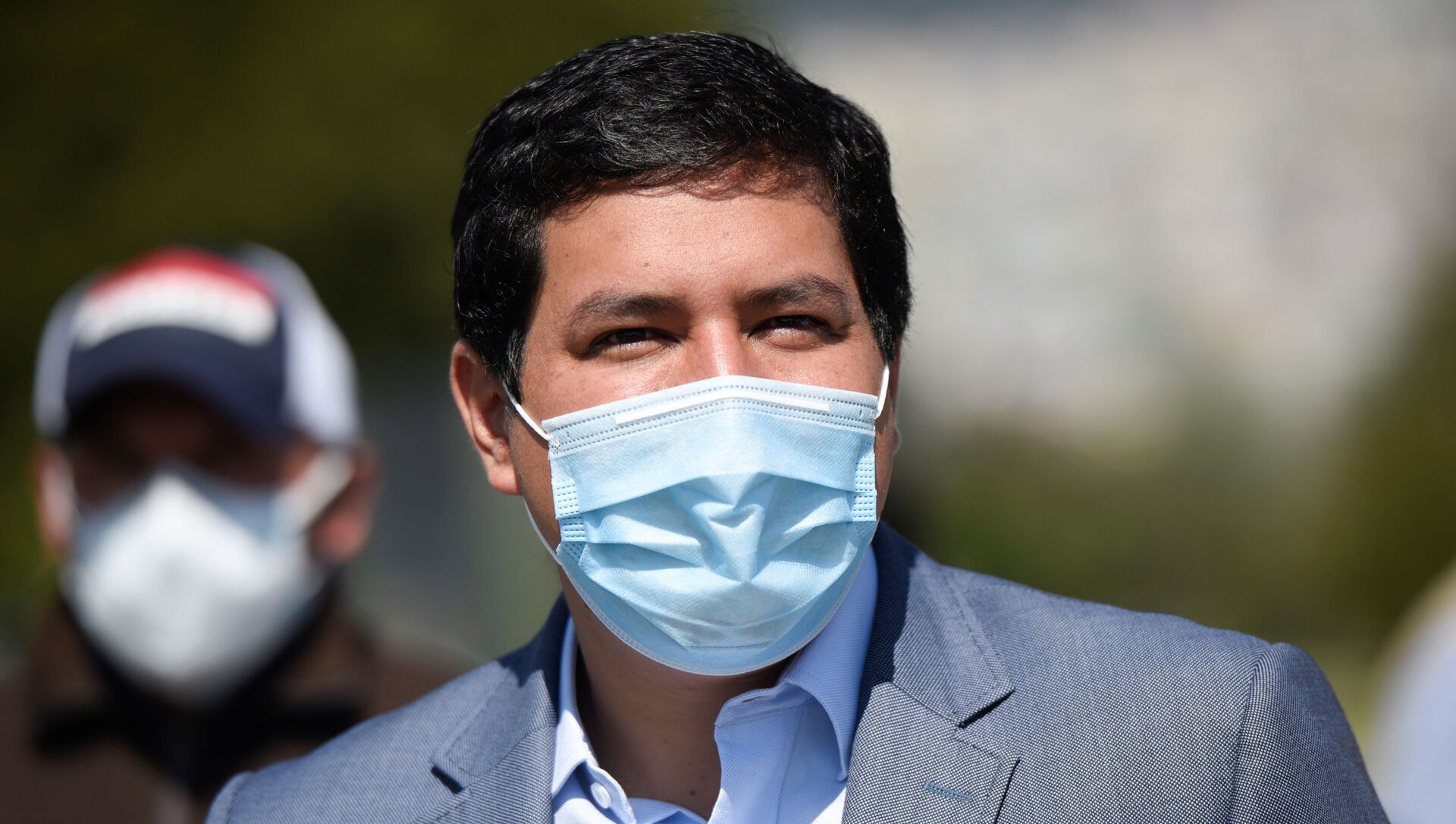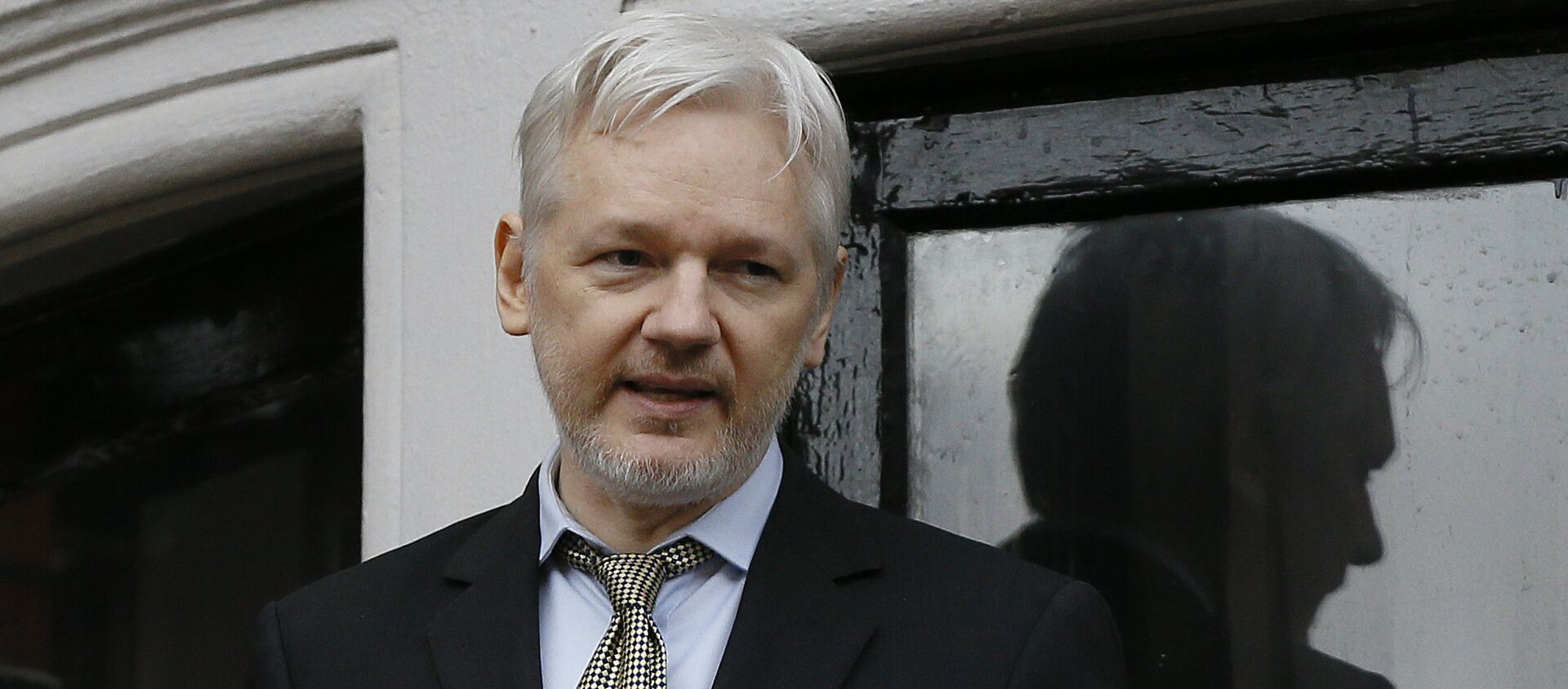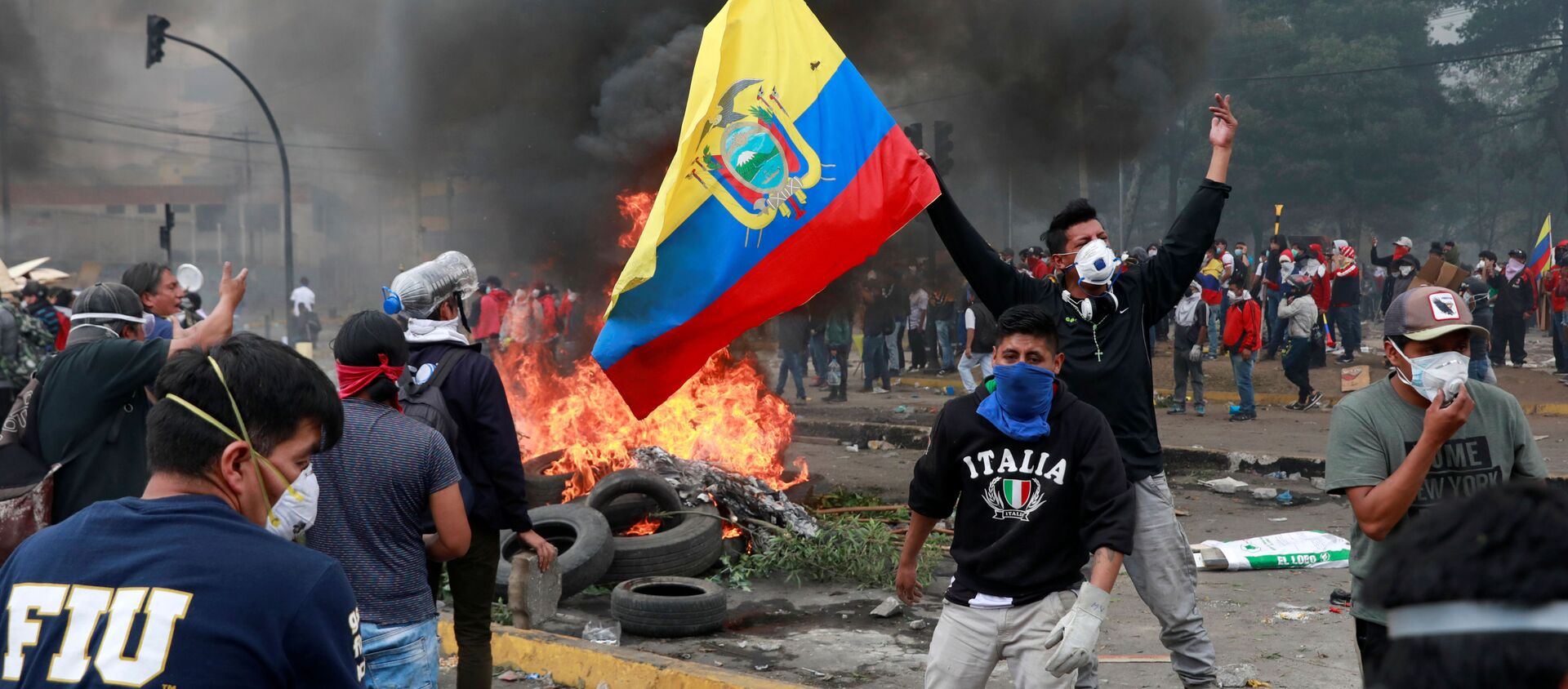Exit polls show Ecuador's progressive candidate Andrés Arauz winning the first round of the country's presidential elections held on 7 February 2021. However, it appears that Arauz did not win by enough of a margin to avoid a second runoff. The election has been marred by allegations of voter suppression, as Ecuadorians were forced to wait for hours in uncharacteristically long polling lines, especially in areas known to support Arauz.
Fidel Narvaez is the ex-counsel and former first secretary to the Ecuadorian Embassy in London. In an exclusive interview with Sputnik, Narvaez explains that even if Arauz does have to go another round with the second closest candidate, the results reflect a clear rejection of the neoliberal policies imposed by current President Lenin Moreno over the last four years.
[Editor's Note: Following this interview, the National Electoral Council of Ecuador projected Guillermo Lasso to drop to third place, with Yaku Perez making his way into second place]
Sputnik: Andrés Arauz has just declared victory in Ecuador's presidential election. Are the results final or is more time needed to certify them? What happens next?
Fidel Narvaez: Well, what we have at the moment of this interview, we have the exit poll results, coming from two different companies and being very, very similar, [it] looks like it might be correct. And it shows that Andrés Arauz has won the first round confidently. He's got something like 36 percent of the votes and is something like 15 points ahead from the second [closest candidate] Lasso with 21 percent. So it's an important, important victory. However, the result is not enough for Andrés Arauz to become the president.
So, they both have to face a second round in April which will decide who is the president. We are very confident that we will win that second round. And we are also very concerned about the conditions that we have had to face in this first round.
It was very clear that the electoral body, under control of the government, but also under control of Mr Lasso, literally was competing against us. With the pretext of the pandemic, many people didn't get to vote. All the polling stations [have seen] long, long queues. And according to the Ecuadorian electoral law, at 5:00 p.m., all the voting stations have to close. So, we are not happy with that because if more people were allowed to vote, we could win the first round.
Ecuador's leftist candidate Andrés Arauz just declared victory in today's election
— Ben Norton (@BenjaminNorton) February 7, 2021
Early exit polls show his socialist Correista party beating right-wing US-backed banker Guillermo Lasso massively
We're waiting for more conclusive results, but this looks like a historic victory https://t.co/8e6uhgADOQ
Sputnik: We’ve seen footage of incredibly long queues of people attempting to vote. Is this normal in Ecuador?
Fidel Narvaez: No, not at all. Absolutely not at all. This is the first time we see it. And especially in those places where we have the strongest support, there was clearly, I think, a strategy to not to allow people to vote.
More images of ridiculously long election lines in #Ecuador
— Alan MacLeod (@AlanRMacLeod) February 7, 2021
Former Pres. Rafael Correa shared this video, decrying it as "a sign of the negligence and bad faith of the National Electoral Council."
Whatever happens, the vote will be marred by this malfeasance#EcuadorDecide2021 pic.twitter.com/Q3ph0dA7wI
Sputnik: How much do you have to win by for there not to be a second round?
Fidel Narvaez: Well, either you have 50 percent plus, or you have to get 40 percent provided that you have a 10 point lead above the second [closest candidate]. So when the official count comes, I'm confident that we will get closer to 40 percent, but probably not enough...
Sputnik: In order to win in the first round?
Fidel Narvaez: In order to win [in the first round].
Sputnik: Who is Andrés Arauz and what is his policy platform? What were the key things he ran on?
Fidel Narvaez: Under the presidency of Rafael Correa, Ecuador went through a transformational process, not just in terms of economics, but also in terms of social policies, which was interrupted, and, in fact, was cut short by Moreno's treason. Andrés Arauz is the continuation of the citizen revolution started by Raphael Correa. So his platform was basically an anti neoliberal platform - with a huge social investment, with recovering Ecuadorian sovereignty over our national resources [and] natural resources as well. Basically, a progressive platform. In this election we had 16 candidates, Andres Arauz was basically the only progressive candidate.
.@BenjaminNorton reports from Ecuador on the eve of the election.
— The Grayzone (@TheGrayzoneNews) February 3, 2021
Protesters condemned the current US-backed gov't, demanding a return to the leftist Citizens' Revolution of ex-President Rafael Correa, represented by candidate Andrés Arauz.
Full video: https://t.co/Cp02NH6N0R pic.twitter.com/FX7KtvY0av
He's going to become president, I'm confident of that, he's going to become the youngest president in Ecuadorian history. He turned 36 years [old] [the day before] yesterday. So he's a very, very bright and talented guy. He's an economist. He's held several important posts in Raphael Correa's government. He was minister of human talent, which basically looks at education and innovation, and technology. He was for a while in charge of the central bank. He's a brilliant guy and is a result of the citizen revolution. He's a fresh face, and is basically a new generation of politicians in Ecuador.
Sputnik: Do you know Andrés Arauz from when you worked in the same government as Rafael Correa?
Fidel Narvaez: Yes. I had the privilege to know him personally. He visited London a couple of times. I have met him. I arranged for him an agenda in London to meet research centres and politicians as well. So yes. He's visited the embassy quite a few times.
I was the consul of Ecuador for three years to begin with and then I was first secretary of the embassy for another five years. I was responsible for providing consular services to our own community [in the UK], but also to whoever wants to visit Ecuador or has relationships with Ecuador. As first secretary, I was kind of a political attaché.
Sputnik: So you advised on political affairs?
Fidel Narvaez: I was advising on political affairs and I was building political relationships for my country and for the embassy as well.
Sputnik: Did this come to an end when Lenin Moreno became president?
Fidel Narvaez: Soon after.
Sputnik: Guillermo Lasso was the candidate who won the second most votes in the presidential election. What kinds of policies and interests did he champion on the campaign trail?
Fidel Narvaez: Well, Guillermo Lasso is one of the richest people in Ecuador. This is his third attempt to become president. He is the darling and the chosen one of the United States. He's a banker. He's an extreme conservative and neoliberal. And he lost the presidential election four years ago against Lenin Moreno. Remember that Lenin Moreno came from the same political platform as President Correa. In a quite surreal way, very difficult to understand for Europeans, even for Latin Americans, Moreno betrayed, completely betrayed his voters, his party, and his predecessor. And from day one, he started to adopt, to implement, the manifesto, the policies of the losing side that is Mr Lasso.
Sputnik: Did Guillermo Lasso go into detail about the kinds of policies that he would support during his campaign?
Fidel Narvaez: Obviously, in the campaign [Lasso] tried to distance himself as much as he could from the government. As all the other candidates [did]. Nobody wanted to be associated with the [current] government. But his policies are well known for many years in Ecuador, a very radical neoliberal programme. However, especially in the last weeks of his campaign, due to not being able to get the popular vote, he started offering very [populist] policies. Like raising the basic salary, by quite a lot, like saying education and health services should be free, basically trying to adopt more social policies, because he knew that [he] won't win the election [otherwise].
But he is also kind of ultra-conservative in many [of his] views. He is against abortion. He might be against gay marriage. He basically was for the legalisation of weapons possession – things that Ecuador is very far away from. I don't think that plays well, especially with [the] younger generations.
Sputnik: Why has Lenin Moreno had such poor approval ratings during the time of these elections?
Fidel Narvaez: Well, it's a unique combination of ineptitude and corruption, but also he is a compulsive liar, and Ecuadorians do not tolerate treason. As I said, four years ago, he won the elections on a specific progressive platform, and he abandoned that as soon as he got into power. So, all the social and economic indicators have totally worsened with Moreno's government. He has got into a huge external debt and practically no performance, no infrastructure, no social investment; [he's] a total failure.
Sputnik: What are some of the examples of how his policies differed from that of his predecessor, Rafael Correa?
Fidel Narvaez: Correa had the most progressive governmental agenda in Ecuadorian history. And Moreno, basically, had probably the most radical neoliberal agenda. So, he has reduced the size of the state. In practical terms it has led to huge amounts of public servants and employees losing their jobs, among them doctors and teachers. The reduction of investment in education and healthcare. And in terms of international policy, total alignment with the United States and letting the international monetary institutions implement the economic agenda in Ecuador.
Sputnik: So, that would be like the privatisation of state assets?
Fidel Narvaez: He is obsessed with privatising state assets. And he's desperately trying to do it before he has to leave in May this year. The only reason why he hasn't been successful in fully implementing that agenda is because the legal system that was implemented by Rafael Correa, and most specifically the Ecuadorian constitution, ensures that certain services should be under state control. So that's the reason why Moreno hasn't managed to fully implement his neoliberal agenda.
But one thing I think is important to say here – traditionally, before Correa became president, Ecuador was a very unstable country, politically. We had many presidents in only one decade because civil society and social movements were quite well organised and always managed to get rid of previous governments and previous presidents that also betrayed the people. In the case of Moreno it hasn't been possible despite his unpopularity. Why? Because he has managed to get on his side all the factual powers in Ecuador.
Sputnik: Factual powers?
Fidel Narvaez: We call it factual powers [de facto powers] in Ecuador. I'm talking about the finance sector. I'm talking about media. I'm talking about the army. The church. So, that's the only reason he managed to stay in power.
Sputnik: In light of all of that, what's the significance, in your mind, of the current election results, even if it does end up leading to a second round?
Fidel Narvaez: The result is very important. Very important. Why? Because this is also one of the reasons why Moreno was so unpopular. Because he has launched the fiercest, the most brutal and obscene political persecution that Ecuador has seen ever.
Then apart from him, Rafael Correa is facing many cases of alleged abuse of power or alleged corruption – no truth, no evidence. The only aim of all of that was to ban him from running [against him in a future election] or from coming back into Ecuador. He remains in exile in Belgium. Many others of the main political leaders from the citizens revolution are either legally persecuted, or already in exile, some of them as political asylees abroad.
Sputnik: Am I correct in thinking that Lenin Moreno dismantled the political party that he was originally part of and that actually helped bring him into power in the first place?
Fidel Narvaez: Totally. But Moreno didn't care about destroying the party or dividing the party. So that's why this result is very significant. Despite this political persecution that has lasted four years [and] the control of all the media in Ecuador, the only ones he could not control are small alternative media, despite the defamation, the outright lying about Correa, the citizen revolution, [and] about the progressive alternative in Ecuador, despite all of that, it's a huge win.
Any political party, imagine here in Europe, would want to have 36 percent of the support of the people and a 15 point lead from the next closest candidate. I'm talking about these results being achieved against the state power, against all powerful media and under very, very hard conditions, and then with an electoral body that clearly, clearly tried to impede this result.
* This interview has been edited for clarity and concision.




